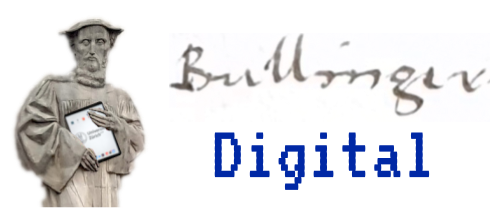Navigation auf uzh.ch
Navigation auf uzh.ch

Heinrich Bullinger (1504–1575) was a collaborator and successor of Huldrich Zwingli and an important multiplier for the ideas of the Reformation in Switzerland and Europe. From his extensive correspondence, some 2000 letters that Bullinger wrote and 10,000 letters that he received have been preserved. The originals are kept in the Zurich State Archives and the Zurich Central Library. 80% of the letters are in Latin, most of the others in Early New High German. The Bullinger Digital project was based on the data compiled by the Swiss Reformation Studies Institute (IRG). These include the metadata for the entire correspondence, 3,100 letters that have already been edited and provisional transcriptions of a further 5,400 letters.
Bullinger Digital aimed to make the entire correspondence available online. In the first step, the metadata existing on index cards was digitized and transferred into a database with the help of the interested public (Citizen Science campaign). In the second step, the database was enriched with the existing transcriptions, the scholarly commentaries from the HBBW edition and the facsimiles created specifically for the project. Based on scan-aligned transcriptions, we trained handwritten text recognition systems (HTR) to convert the remaining 3,500 letters efficiently into electronic text. We also trained a machine translation system to translate the letters written in Early Modern Latin into modern German. We developed a model for normalizing letters written in Early New High German. The result of these efforts is available at www.bullinger-digital.ch. The TEI-compliant XML corpus can be downloaded from the website.
In the follow-up project, Bullinger Digital 2.0, we aim to transfer Bullinger Digital to the TEI Publisher to guarantee the long-term availability of online access. We will enrich the corpus with automatically extracted keywords, improve automatic named entity recognition (NER), and have it reviewed/corrected in another Citizen Science campaign. Additionally, linking the Bullinger correspondence with other knowledge resources and digital editions will be further expanded.
Bullinger Digital: January 2021 – May 2023
Bullinger Digital 2.0: January 2024 – June 2025